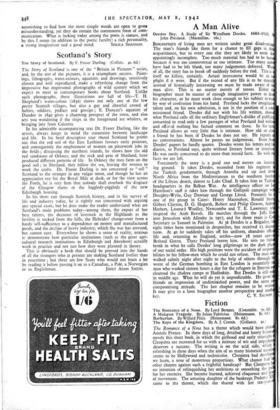A Man Alive
Deedes Bey. A Study of Sir Wyndham Deedes. 1883-1923, John Presland. (Macmillan. x6s.)
BIOGRAPHIES of living men are written under great disadvantag The man's friends like them for a chance to fill gaps in th acquaintance, but to every one else they are likely to seem appointingly incomplete. Too much material has had to be buni because it was too controversial or too intimate. Too many nam have had to be left blank, too many judgements deferred. Wo of all, the story has to break off suddenly before the end. This is itself no killjoy, certainly. Actual intercourse would be in plight if it were. But if the record of any life is to be morta instead of historically interesting we must be made aware Of man alive. This is no matter merely of tenses. Either / biographer must be master of enough imaginative power to dra his character, or he must work close enough to his subject to wri by way of confession from his hand. Presland lacks the imaginau talent and, on his own admission, is not in the position of a missioned friend. Deedes did not wish his life written, show what Presland calls all the ordinary Englishman's dislike of publici consented to read only a few passages of what Presland had writt and offered nothing but factual comment on those. In his Presland allows us very little that is intimate. How old or cl a friend he has been of Deedes he does not say. He reports no conversations. Almost he passes no judgements. Even fr Deedes' papers he hardly quotes. Deedes wrote his letters and diaries, so Presland says, quite without literary form or intenti He was rarely concerned to do more than record facts. So with t facts we are left.
Fortunately the story is a good one and moves on intere ing ground. It takes Deedes, seconded from his regiment the Turkish gendarmerie through Anatolia and up and d North Africa from the Mediterranean to the southern horde of the Libyan desert, almost to Lake Chad. It takes him to Turki headquarters in the Balkan War. As intelligence officer on I Hamilton's staff it takes him through the Gallipoli campaign w Doughty-Wylie, Guy Dawnay and George Lloyd. Presently he one of the group in Cairo: Henry Macmahon, Ronald Sto Gilbert Clayton, D. G. Hogarth, Robert and Philip Graves, Aubr Herbert, Leonard Woolley, Newcombe and T. E. Lawrence, w inspired the Arab Revolt. He marches through the Jaffa G into Jerusalem with Allenby in 1917, and for three years is Ci Secretary to Samuel in Palestine. At 36 Deedes is a Brigadier, eight times been mentioned in despatches has received 13 deco tions. At 4o he suddenly takes off his Uniform, abandons offi life and, returning to England, settles—now 18 years ag Bethnal Green. There Presland leaves him. He sees no rad break in what he calls Deedes' long pilgrimage to the dark pla of our social order. His high positions were the accident of respon bilities to his fellow-men which he could not refuse. The man a walked calmly night after night to the help of others through worst of the German bombing in East London is essentially man who worked sixteen hours a day for the refugees in Smyrna cleansed the cholera camps at Hadimktiy. But Deedes is still o in middle age. What he will do yet is unpredictable. He gives friends an impression of undiminished power, and the same compromising attitude. The last chapter remains to be wriu It may give to a later biographer another perspective and an
key. C. V. Satatotc






















 Previous page
Previous page